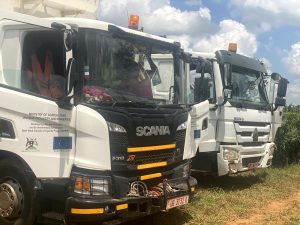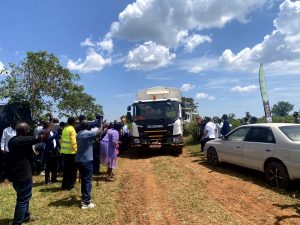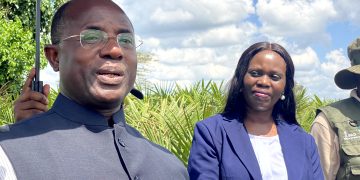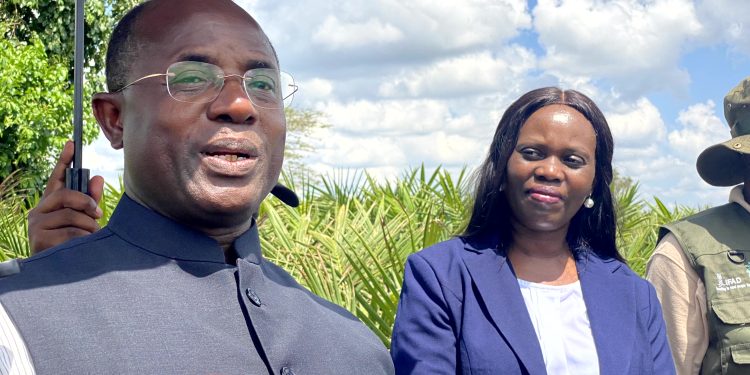Mayuge – Oil palm growing has officially taken root in the Busoga sub-region, with the launch of the National Oil Palm Project (NOPP) in Mayuge, Bugiri, and Namayingo districts last week.
The initiative, spearheaded by the Ministry of Agriculture, Animal Industry and Fisheries (MAAIF) and funded by the International Fund for Agricultural Development (IFAD), aims to boost domestic vegetable oil production and transform rural livelihoods.
Flagging off the planting exercise at Mayuge District Headquarters last Friday, State Minister for Agriculture Hon. Fred Bwino Kyakulaga described the event as a turning point for Busoga’s economy. “Within four years, you will see transformation in this region—new businesses emerging, and communities thriving,” he said. “The oil palm project will bring a complete shift in livelihoods.”
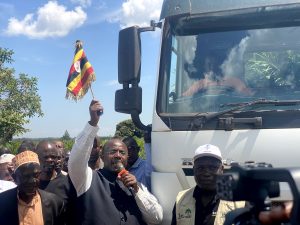
The Mayuge hub currently has 50,000 seedlings ready for delivery, and the project targets 10,000 hectares across the three districts. So far, farmers have prepared over 2,600 acres of land, dug more than 54,000 planting holes, and planted over 22,000 seedlings.
Kyakulaga said the project will not only provide stable incomes for farmers but also generate value chain opportunities across transport, processing, and trade. “Once the bunches of oil palm fruit are harvested, they are processed into oil at the mill. This means people with trucks will get business from transporting the fruits, and farmers will start earning regularly, every month,” he said. “If a farmer has 2.5 acres, they can earn around UGX 2.5 million monthly. The oil palm is harvested every two weeks, and this continues for 25 to 30 years.”
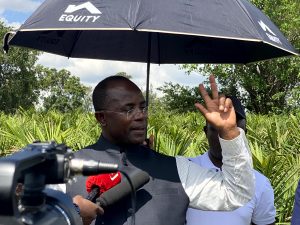
He noted that the project is designed to tackle rural poverty while reducing Uganda’s dependence on imported palm oil, which costs the country an estimated USD 300 million annually.
In 2023, Uganda spent approximately $336 million on importing palm oil, according to The Observatory of Economic Complexity (OEC). Other sources show that the import value of RBD Palm Oil alone was around $305.8 million in 2023.
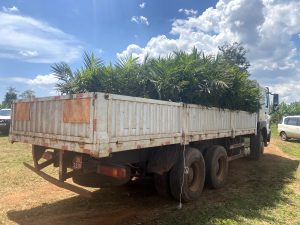
Equity Bank’s Role in the Oil Palm Value Chain
The government has partnered with Equity Bank Uganda to manage and disburse funds under the project. The bank is responsible for holding, disbursing, and tracking funds to smallholder farmers, while also providing financial literacy and capacity-building programs to enhance accountability and sustainability.
Catherine Psomgen, Director for Public Sector and Social Investments at Equity Bank Uganda, said the initiative aligns with the bank’s broader mission to drive agricultural transformation.
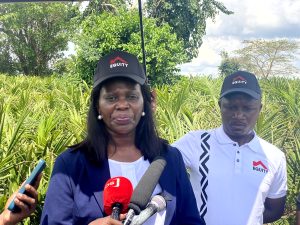
“Equity Bank has, over the past two years, supported more than 900 farmers in Mayuge, Bugiri, and Namayingo, with funding amounting to UGX 2.1 billion,” she revealed. “This aligns with our Africa Resilience and Recovery Plan, where we have committed over 30 percent of our loan portfolio to food and agriculture.”
She explained that the bank’s approach goes beyond lending. “We don’t just disburse funds—we build trust, ensure efficiency, and promote sustainable growth,” Psomgen said. “We employ modern banking systems to track every transaction, verify beneficiaries, and ensure funds reach genuine farmers in record time.”
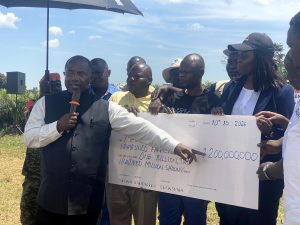
Equity Bank also offers free financial literacy training to all participating farmers. “We help farmers manage their finances, invest wisely, and plan for long-term productivity,” she added. “Every seed planted is a dream, and every harvest is a reward for faith, patience, and dedication.”
The credit facility, available through Equity Bank at a 10% interest rate, is structured to give farmers a four-year grace period before repayment begins, with a total tenure of ten years. Each farmer can access up to UGX 25 million, depending on the size of their landholding.
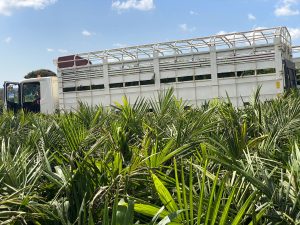
Farmers Report Steady Progress
At the event, Moses Mabanda, Chairperson of the Mayuge District Oil Palm Growers Cooperative Society, presented a progress report to the Minister. The cooperative, now boasting 752 registered members, has so far received UGX 428 million from Equity Bank for land clearing and maintenance.
“Planting began in April 2024, and by today, we have planted over 22,000 seedlings,” Mabanda said. “However, we still face challenges like delays in seedling supply since most come from Buvuma and Sango Bay.”
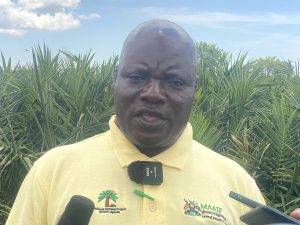
He appealed to the government to establish a local nursery bed in Mayuge to accelerate planting and reduce transport delays. The cooperative is also seeking logistical support, such as motorcycles for extension staff to monitor progress.
In Namayingo, chairperson Waiswa Siraje said 2,293 seedlings have been planted so far, with more than 1,900 holes ready for the next delivery. “We have dug 42,000 holes across the district, covering 268 hectares, and we’re waiting for seedlings from Sango Bay,” he said.
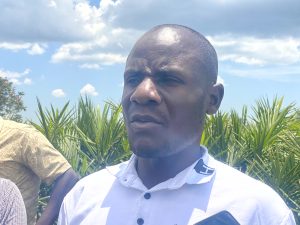
Meanwhile, in Bugiri District, Katooko Sowali, Chairperson of the local outgrowers’ society, reported that 402 farmers have joined the project, with over 17,800 seedlings planted on approximately 181 acres. “We are grateful for the government and Equity Bank’s support, but we urge faster payments for farmers who have completed garden preparation,” he said.
Government’s Commitment to Agro-Industrialisation
Minister Kyakulaga emphasised that oil palm is a model commodity under Uganda’s Agro-Industrialisation Program, noting its role in import substitution and job creation. “This project is fully funded—the first phase is worth USD 76 million from IFAD, rising to USD 210 million with private sector participation,” he said. “All the funds are already available; we are not waiting for future budgets.”
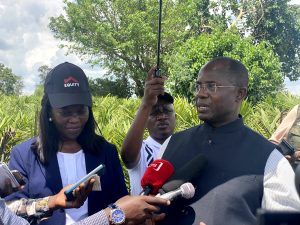
Kyakulaga also addressed concerns about bureaucracy, explaining that funds are disbursed through farmer cooperatives to ensure accountability. “Farmers will not receive cash directly. The money goes to their accounts and is used for approved activities—like land preparation, planting, and fertiliser application,” he explained.
Phase One of the project covers Mayuge, Bugiri, and Namayingo, while Phase Two—set for next year—will expand to Bugweri, Iganga, Luuka, and Jinja.
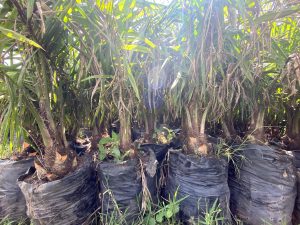
He reassured residents that oil palm will not replace other traditional crops. “Sugarcane remains a strategic crop, and oil palm will complement it. The two will coexist peacefully,” he said.
“Busoga has waited long enough,” said Kyakulaga. “Now is the time for transformation. Let the people of Busoga embrace this project and support the government so that we can complete this journey together.”
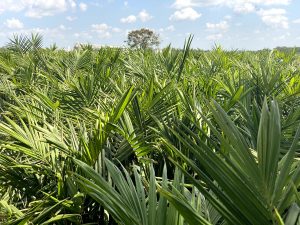
Psomgen echoed his optimism: “At Equity Bank, we will continue to walk with the farmers every step of the way—from seedling to harvest, from farm to market. Together, we are planting the seeds of prosperity.”
